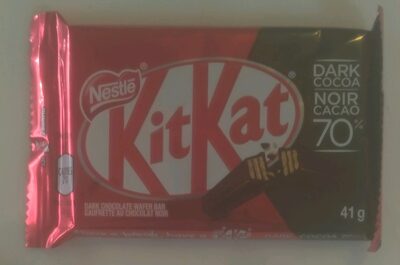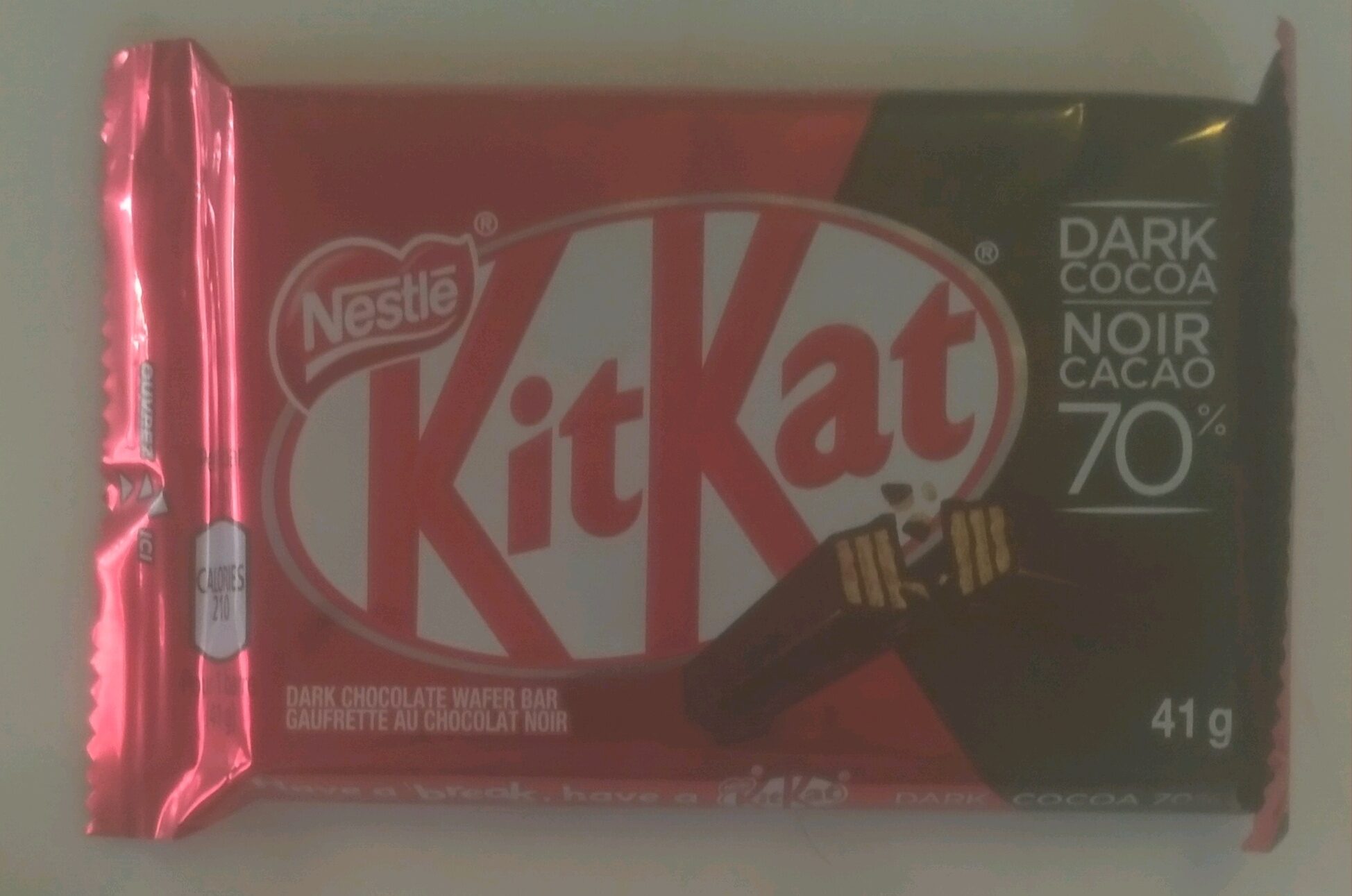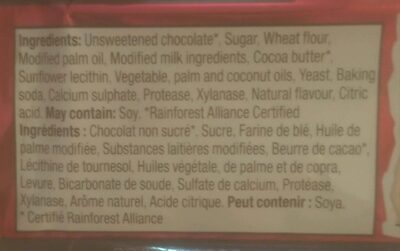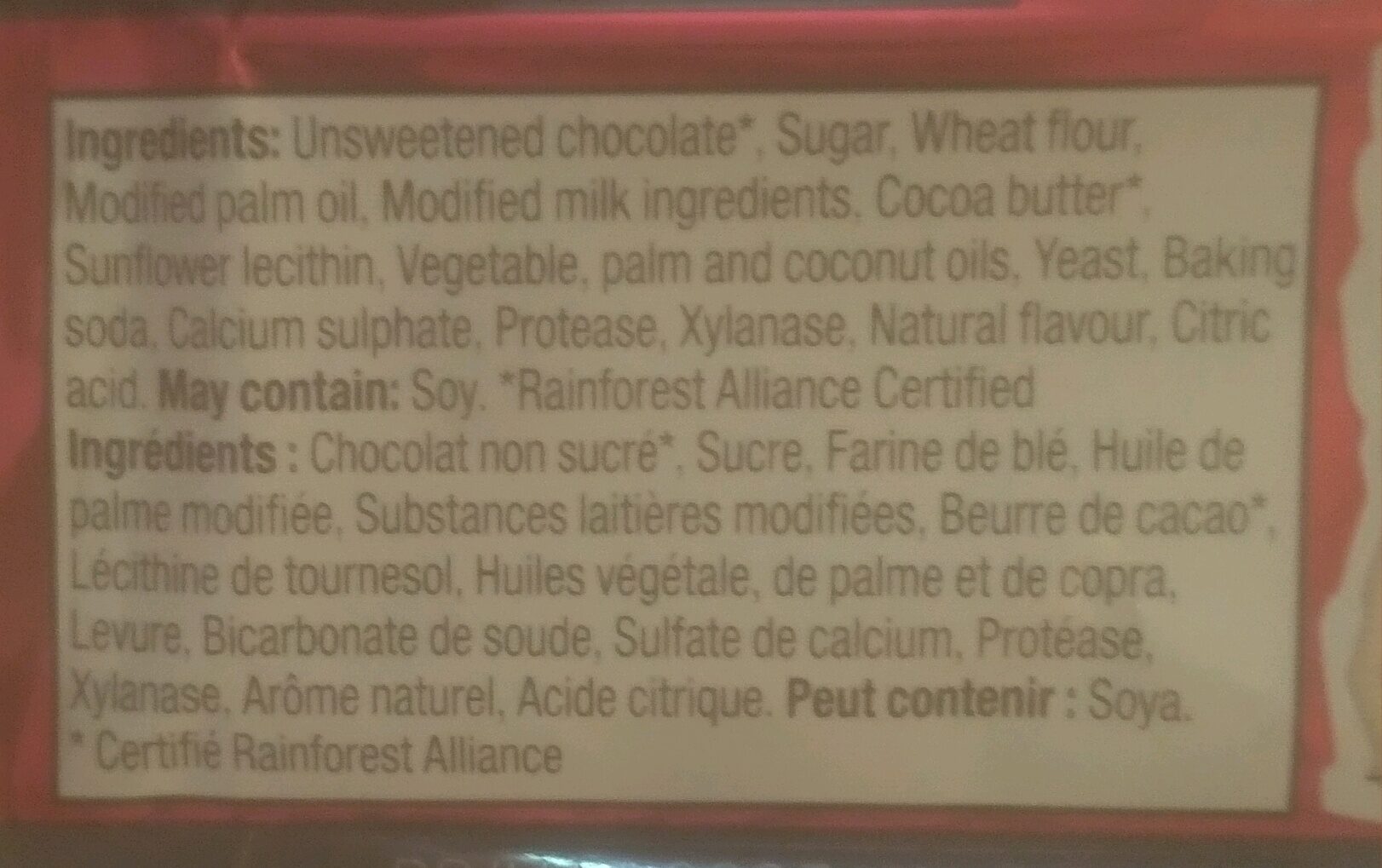Help us make food transparency the norm!
As a non-profit organization, we depend on your donations to continue informing consumers around the world about what they eat.
The food revolution starts with you!
70% Dark Cocoa KitKat - Nestlé - 41 g
70% Dark Cocoa KitKat - Nestlé - 41 g
This product page is not complete. You can help to complete it by editing it and adding more data from the photos we have, or by taking more photos using the app for Android or iPhone/iPad. Thank you!
×
Barcode: 0059800849302 (EAN / EAN-13) 059800849302 (UPC / UPC-A)
Quantity: 41 g
Brands: Nestlé
Categories: Snacks, Sweet snacks, Cocoa and its products, Confectioneries, Bars, Chocolate candies, Bars-covered-with-chocolate, Chocolate biscuity bars
Labels, certifications, awards:
Natural flavors, Nestlé Cocoa Plan, Rainforest Alliance, Rainforest Alliance Cocoa
Link to the product page on the official site of the producer: https://www.madewithnestle.ca/kitkat/kit...
Countries where sold: Canada, United States
Matching with your preferences
Health
Ingredients
-
17 ingredients
Unsweetened chocolate, Sugar, Wheat flour, Modified palm oil, Modified milk ingredients, Cocoa butter, Sunflower lecithin, Vegetable, palm and coconut oils, Yeast, Baking soda, Calcium sulphate, Protease, Xylanase, Natural flavour, Citric acidAllergens: GlutenTraces: Soybeans
Food processing
-
Ultra processed foods
Elements that indicate the product is in the 4 - Ultra processed food and drink products group:
- Additive: E322 - Lecithins
- Ingredient: Flavouring
Food products are classified into 4 groups according to their degree of processing:
- Unprocessed or minimally processed foods
- Processed culinary ingredients
- Processed foods
- Ultra processed foods
The determination of the group is based on the category of the product and on the ingredients it contains.
Additives
-
E1101 - Protease
Protease: A protease -also called a peptidase or proteinase- is an enzyme that performs proteolysis: protein catabolism by hydrolysis of peptide bonds. Proteases have evolved multiple times, and different classes of protease can perform the same reaction by completely different catalytic mechanisms. Proteases can be found in Animalia, Plantae, Fungi, Bacteria, Archaea and viruses.Source: Wikipedia
-
E322 - Lecithins
Lecithins are natural compounds commonly used in the food industry as emulsifiers and stabilizers.
Extracted from sources like soybeans and eggs, lecithins consist of phospholipids that enhance the mixing of oil and water, ensuring smooth textures in various products like chocolates, dressings, and baked goods.
They do not present any known health risks.
-
E322i - Lecithin
Lecithins are natural compounds commonly used in the food industry as emulsifiers and stabilizers.
Extracted from sources like soybeans and eggs, lecithins consist of phospholipids that enhance the mixing of oil and water, ensuring smooth textures in various products like chocolates, dressings, and baked goods.
They do not present any known health risks.
-
E330 - Citric acid
Citric acid is a natural organic acid found in citrus fruits such as lemons, oranges, and limes.
It is widely used in the food industry as a flavor enhancer, acidulant, and preservative due to its tart and refreshing taste.
Citric acid is safe for consumption when used in moderation and is considered a generally recognized as safe (GRAS) food additive by regulatory agencies worldwide.
-
E500 - Sodium carbonates
Sodium carbonates (E500) are compounds commonly used in food preparation as leavening agents, helping baked goods rise by releasing carbon dioxide when they interact with acids.
Often found in baking soda, they regulate the pH of food, preventing it from becoming too acidic or too alkaline. In the culinary world, sodium carbonates can also enhance the texture and structure of foods, such as noodles, by modifying the gluten network.
Generally recognized as safe, sodium carbonates are non-toxic when consumed in typical amounts found in food.
-
E500ii - Sodium hydrogen carbonate
Sodium hydrogen carbonate, also known as E500ii, is a food additive commonly used as a leavening agent.
When added to recipes, it releases carbon dioxide gas upon exposure to heat or acids, causing dough to rise and resulting in a light, fluffy texture in baked goods.
It is generally recognized as safe (GRAS) by regulatory authorities when used in appropriate quantities and poses no significant health risks when consumed in typical food applications.
Ingredients analysis
-
Palm oil
Ingredients that contain palm oil: Modified palm oil, Palm
-
Non-vegan
Non-vegan ingredients: Modified milk ingredients
-
Maybe vegetarian
Ingredients that may not be vegetarian: Xylanase, Natural flavouring
-
Details of the analysis of the ingredients
: chocolate, Sugar, Wheat flour, Modified palm oil, Modified milk ingredients, Cocoa butter, Sunflower lecithin, Vegetable, palm, coconut oils, Yeast, Baking soda, Calcium sulphate, Protease, Xylanase, Natural flavour, Citric acid- chocolate -> en:chocolate - vegan: maybe - vegetarian: yes - percent_min: 5.88235294117647 - percent_max: 100
- Sugar -> en:sugar - vegan: yes - vegetarian: yes - ciqual_proxy_food_code: 31016 - percent_min: 0 - percent_max: 29.3
- Wheat flour -> en:wheat-flour - vegan: yes - vegetarian: yes - ciqual_proxy_food_code: 9410 - percent_min: 0 - percent_max: 29.3
- Modified palm oil -> en:modified-palm-oil - vegan: yes - vegetarian: yes - from_palm_oil: yes - ciqual_food_code: 16129 - percent_min: 0 - percent_max: 25
- Modified milk ingredients -> en:modified-milk-ingredients - vegan: no - vegetarian: yes - ciqual_proxy_food_code: 19051 - percent_min: 0 - percent_max: 20
- Cocoa butter -> en:cocoa-butter - vegan: yes - vegetarian: yes - ciqual_food_code: 16030 - percent_min: 0 - percent_max: 16.6666666666667
- Sunflower lecithin -> en:sunflower-lecithin - vegan: yes - vegetarian: yes - percent_min: 0 - percent_max: 14.2857142857143
- Vegetable -> en:vegetable - vegan: yes - vegetarian: yes - percent_min: 0 - percent_max: 12.5
- palm -> en:palm - vegan: yes - vegetarian: yes - from_palm_oil: yes - ciqual_food_code: 16129 - percent_min: 0 - percent_max: 11.1111111111111
- coconut oils -> en:coconut-oil - vegan: yes - vegetarian: yes - from_palm_oil: no - ciqual_food_code: 16040 - percent_min: 0 - percent_max: 10
- Yeast -> en:yeast - vegan: yes - vegetarian: yes - percent_min: 0 - percent_max: 9.09090909090909
- Baking soda -> en:e500ii - vegan: yes - vegetarian: yes - percent_min: 0 - percent_max: 8.33333333333333
- Calcium sulphate -> en:e516 - vegan: yes - vegetarian: yes - percent_min: 0 - percent_max: 7.69230769230769
- Protease -> en:e1101 - vegan: yes - vegetarian: yes - percent_min: 0 - percent_max: 7.14285714285714
- Xylanase -> en:xylanase - vegan: maybe - vegetarian: maybe - percent_min: 0 - percent_max: 6.66666666666667
- Natural flavour -> en:natural-flavouring - vegan: maybe - vegetarian: maybe - percent_min: 0 - percent_max: 5
- Citric acid -> en:e330 - vegan: yes - vegetarian: yes - percent_min: 0 - percent_max: 5
Nutrition
-
Poor nutritional quality
⚠ ️Warning: the amount of fruits, vegetables and nuts is not specified on the label, it was estimated from the list of ingredients: 0This product is not considered a beverage for the calculation of the Nutri-Score.
Positive points: 5
- Proteins: 4 / 5 (value: 7.32, rounded value: 7.32)
- Fiber: 5 / 5 (value: 9.76, rounded value: 9.76)
- Fruits, vegetables, nuts, and colza/walnut/olive oils: 0 / 5 (value: 0.554963235294117, rounded value: 0.6)
Negative points: 22
- Energy: 6 / 10 (value: 2140, rounded value: 2140)
- Sugars: 6 / 10 (value: 29.3, rounded value: 29.3)
- Saturated fat: 10 / 10 (value: 17.1, rounded value: 17.1)
- Sodium: 0 / 10 (value: 12.2, rounded value: 12.2)
The points for proteins are not counted because the negative points are greater or equal to 11.
Nutritional score: (22 - 5)
Nutri-Score:
-
Nutrient levels
-
Fat in high quantity (34.1%)
What you need to know- A high consumption of fat, especially saturated fats, can raise cholesterol, which increases the risk of heart diseases.
Recommendation: Limit the consumption of fat and saturated fat- Choose products with lower fat and saturated fat content.
-
Saturated fat in high quantity (17.1%)
What you need to know- A high consumption of fat, especially saturated fats, can raise cholesterol, which increases the risk of heart diseases.
Recommendation: Limit the consumption of fat and saturated fat- Choose products with lower fat and saturated fat content.
-
Sugars in high quantity (29.3%)
What you need to know- A high consumption of sugar can cause weight gain and tooth decay. It also augments the risk of type 2 diabetes and cardio-vascular diseases.
Recommendation: Limit the consumption of sugar and sugary drinks- Sugary drinks (such as sodas, fruit beverages, and fruit juices and nectars) should be limited as much as possible (no more than 1 glass a day).
- Choose products with lower sugar content and reduce the consumption of products with added sugars.
-
Salt in low quantity (0.0305%)
What you need to know- A high consumption of salt (or sodium) can cause raised blood pressure, which can increase the risk of heart disease and stroke.
- Many people who have high blood pressure do not know it, as there are often no symptoms.
- Most people consume too much salt (on average 9 to 12 grams per day), around twice the recommended maximum level of intake.
Recommendation: Limit the consumption of salt and salted food- Reduce the quantity of salt used when cooking, and don't salt again at the table.
- Limit the consumption of salty snacks and choose products with lower salt content.
-
-
Nutrition facts
Nutrition facts As sold
for 100 g / 100 mlAs sold
per serving (41 g)Compared to: Chocolate biscuity bars Energy 2,140 kj
(512 kcal)879 kj
(210 kcal)-2% Fat 34.1 g 14 g +20% Saturated fat 17.1 g 7 g +9% Trans fat 0.244 g 0.1 g +55% Cholesterol 12.2 mg 5 mg +62% Carbohydrates 56.1 g 23 g -3% Sugars 29.3 g 12 g -33% Fiber 9.76 g 4 g +336% Proteins 7.32 g 3 g +8% Salt 0.03 g 0.012 g -89% Potassium 549 mg 225 mg +78% Calcium 73.2 mg 30 mg -49% Iron 9.76 mg 4 mg +411% Fruits‚ vegetables‚ nuts and rapeseed‚ walnut and olive oils (estimate from ingredients list analysis) 0.555 % 0.555 %
Environment
-
Eco-Score C - Moderate environmental impact
⚠ ️Select a country in order to include the full impact of transportation.The Eco-Score is an experimental score that summarizes the environmental impacts of food products.→ The Eco-Score was initially developped for France and it is being extended to other European countries. The Eco-Score formula is subject to change as it is regularly improved to make it more precise and better suited to each country.Life cycle analysis
-
Average impact of products of the same category: C (Score: 53/100)
Category: Chocolate bar with biscuit
Category: Chocolate bar with biscuit
- PEF environmental score: 0.51 (the lower the score, the lower the impact)
- including impact on climate change: 6.55 kg CO2 eq/kg of product
Stage Impact Agriculture
51.2 %Processing
40.6 %Packaging
4.4 %Transportation
2.8 %Distribution
0.9 %Consumption
0.0 %
Bonuses and maluses
-
Missing origins of ingredients information
Malus: -5
⚠ ️ The origins of the ingredients of this product are not indicated.
If they are indicated on the packaging, you can modify the product sheet and add them.
If you are the manufacturer of this product, you can send us the information with our free platform for producers.
-
Ingredients that threatens species
Malus: -10
Contains palm oil
Tropical forests in Asia, Africa and Latin America are destroyed to create and expand oil palm tree plantations. The deforestation contributes to climate change, and it endangers species such as the orangutan, the pigmy elephant and the Sumatran rhino.
-
Packaging with a low impact
Malus: -1
Shape Material Recycling Impact Film Plastic High
Eco-Score for this product
-
Impact for this product: C (Score: 47/100)
Product: 70% Dark Cocoa KitKat - Nestlé - 41 g
Life cycle analysis score: 53
Sum of bonuses and maluses: -6
Final score: 47/100
-
Carbon footprint
-
Equal to driving 3.4 km in a petrol car
655 g CO² per 100g of product
The carbon emission figure comes from ADEME's Agribalyse database, for the category: Chocolate bar with biscuit (Source: ADEME Agribalyse Database)
Stage Impact Agriculture
35.5 %Processing
57.7 %Packaging
4.1 %Transportation
2.4 %Distribution
0.3 %Consumption
0.0 %
Packaging
-
Packaging with a low impact
-
Packaging parts
Film (Plastic)
-
Packaging materials
Material % Packaging weight Packaging weight per 100 g of product Plastic
-
Transportation
-
Origins of ingredients
Missing origins of ingredients information
⚠ ️ The origins of the ingredients of this product are not indicated.
If they are indicated on the packaging, you can modify the product sheet and add them.
If you are the manufacturer of this product, you can send us the information with our free platform for producers.Add the origins of ingredients for this product Add the origins of ingredients for this product
Threatened species
-
Contains palm oil
Drives deforestation and threatens species such as the orangutan
Tropical forests in Asia, Africa and Latin America are destroyed to create and expand oil palm tree plantations. The deforestation contributes to climate change, and it endangers species such as the orangutan, the pigmy elephant and the Sumatran rhino.
Labels
Report a problem
-
Incomplete or incorrect information?
Category, labels, ingredients, allergens, nutritional information, photos etc.
If the information does not match the information on the packaging, please complete or correct it. Open Food Facts is a collaborative database, and every contribution is useful for all.











